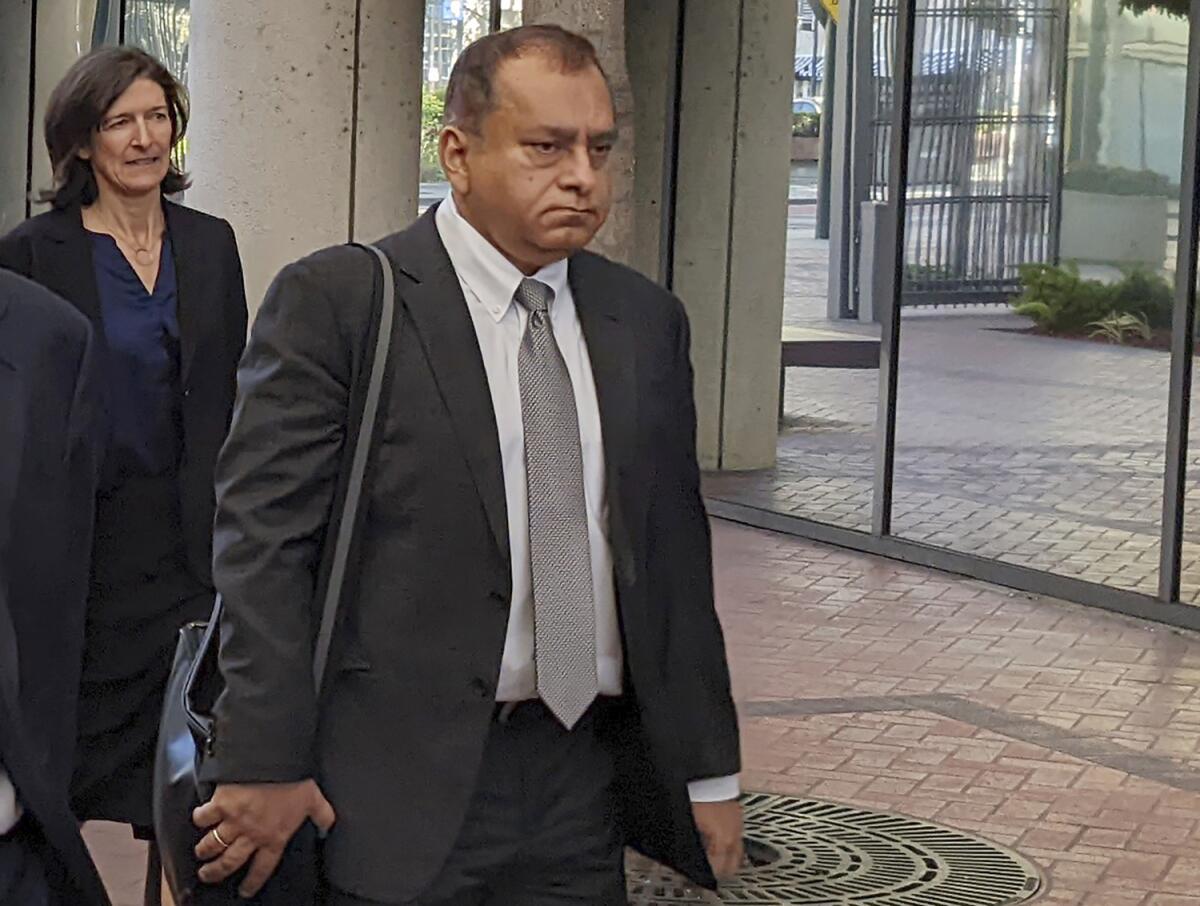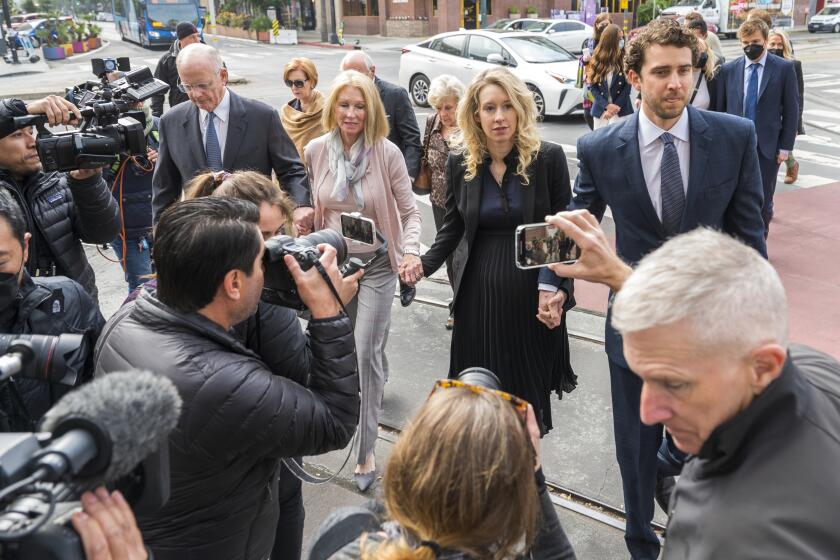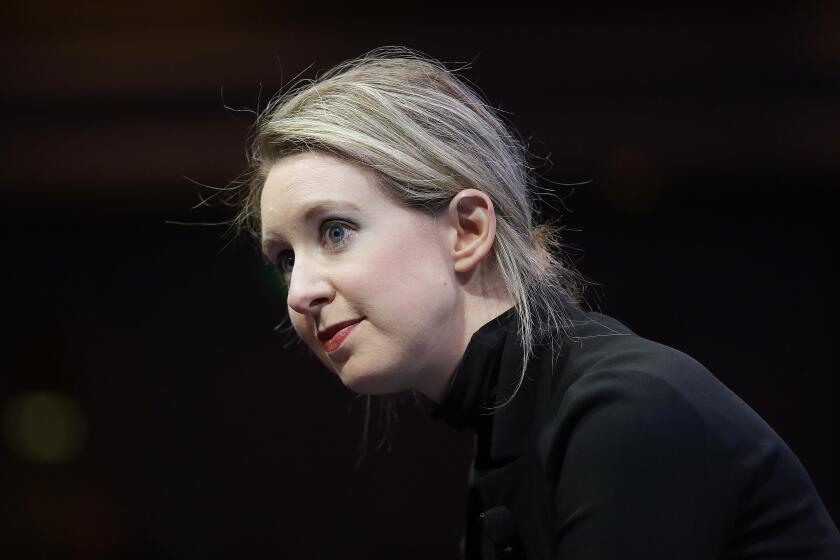Holmes’ former partner gets nearly 13 years in Theranos case

A judge on Wednesday sentenced former Theranos executive Ramesh “Sunny” Balwani to nearly 13 years in prison for his role in the company’s blood-testing hoax — a sentence slightly longer than that given to the company chief, who was his lover and accomplice in one of Silicon Valley’s biggest scandals.
Balwani was convicted in July of fraud and conspiracy connected to the company’s bogus medical technology that duped investors and endangered patients. His sentencing came less than three weeks after Elizabeth Holmes, the company’s founder and chief executive, received more than 11 years in prison for her part in the scheme.
The scandal revolved around the company’s false claims to have developed a device that could scan for hundreds of diseases and other potential problems with just a few drops of blood taken with a finger prick.
After years of promoting the technology, Holmes and Balwani were warned that the blood tests were inaccurate, but they continued to raise money from investors, including billionaires such as software magnate Larry Ellison and media mogul Rupert Murdoch, and deployed the technology in some Walgreens stores.
U.S. District Judge Edward Davila said the financial statements drawn up by Balwani “weren’t just projections, they were lies” and “a true flight from honest business practices.”
Theranos CEO Elizabeth Holmes is sentenced in San Jose to more than 11 years in prison for duping investors.
The case threw a bright light on Silicon Valley’s dark side, exposing how its culture of hype and boundless ambition could veer into lies.
Holmes, 38, could have gotten up to 20 years in prison — a penalty that the judge could have imposed on Balwani, who spent six years as Theranos’ chief operating officer while remaining romantically involved with Holmes until a bitter split in 2016.
While on the witness stand in her trial, Holmes accused Balwani, 57, of manipulating her through years of emotional and sexual abuse. Balwani’s attorney has denied the allegations.
The two trials had somewhat different outcomes. Unlike Balwani, Holmes was acquitted on several charges of defrauding and conspiring against people who paid for Theranos blood tests that produced misleading results and could have pointed patients toward the wrong treatment. The jury in Holmes’ trial also deadlocked on three charges.
Balwani was convicted on all 12 felony counts, and his lawyers sought a far more lenient sentence of just four to 10 months in prison. Prosecutors for the Justice Department asked for 15 years. A probation report recommended nine years.
The lesson of Theranos and the conviction of Elizabeth Holmes is that even big-name investors can be fooled.
Federal prosecutors also want the judge to order Balwani to pay $804 million in restitution to defrauded investors — the same amount sought from Holmes. Davila deferred a decision on restitution to a later hearing, just as he did during Holmes’ Nov. 18 sentencing, when she received 111⁄4 years in prison.
In court documents, Balwani’s lawyers painted him as a hardworking immigrant who moved from India to the U.S. during the 1980s to become the first member of his family to attend college. He graduated from the University of Texas at Austin in 1990 with a degree in information systems.
He later moved to Silicon Valley, where he first worked as a computer programmer for Microsoft before founding an online startup that he sold for millions of dollars during the dot-com boom of the 1990s.
Balwani and Holmes met around the same time she dropped out of Stanford University to start Theranos in 2003. He became enthralled with her and her quest to revolutionize healthcare.
Balwani’s lawyers said he eventually invested about $5 million in a stake in Theranos that eventually became worth about $500 million on paper — a fraction of Holmes’ onetime fortune of $4.5 billion.
That wealth evaporated after Theranos began to unravel in 2015 amid revelations that its blood-testing technology never worked as Holmes had boasted in glowing magazine articles that likened her to Silicon Valley visionaries such as Apple co-founder Steve Jobs.
Before Theranos’ downfall, Holmes teamed up with Balwani to raise nearly $1 billion from deep-pocketed investors.
“Mr. Balwani is not the same as Elizabeth Holmes,” his lawyers wrote in a memo to the judge. “He actually invested millions of dollars of his own money; he never sought fame or recognition; and he has a long history of quietly giving to those less fortunate.” Balwani’s lawyers also asserted that Holmes “was dramatically more culpable” for the Theranos fraud.
Echoing similar claims made by Holmes’ lawyers before her sentencing, Balwani’s attorneys also argued that he has been adequately punished by the intense media coverage of Theranos, which has been the subject of a book, documentary and award-winning TV series.
Balwani “has lost his career, his reputation and his ability to meaningfully work again,” his lawyers wrote.
Federal prosecutors cast Balwani as a ruthless, power-hungry accomplice in crimes that ripped off investors and imperiled people who received flawed results. The blood tests were to be available in a partnership with Walgreens that Balwani helped engineer.
“Balwani presented a fake story about Theranos’ technology and financial stability day after day in meeting after meeting,” the prosecutors wrote in their memo to the judge. “Balwani maintained this facade of accomplishments, after making the calculated decision that honesty would destroy Theranos.”
More to Read
Inside the business of entertainment
The Wide Shot brings you news, analysis and insights on everything from streaming wars to production — and what it all means for the future.
You may occasionally receive promotional content from the Los Angeles Times.












